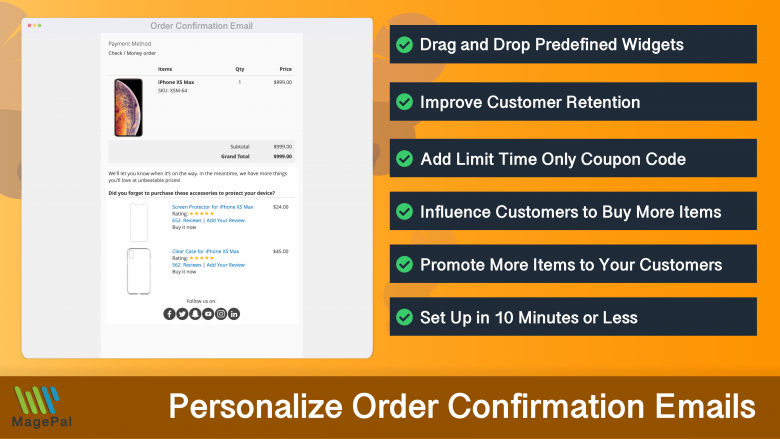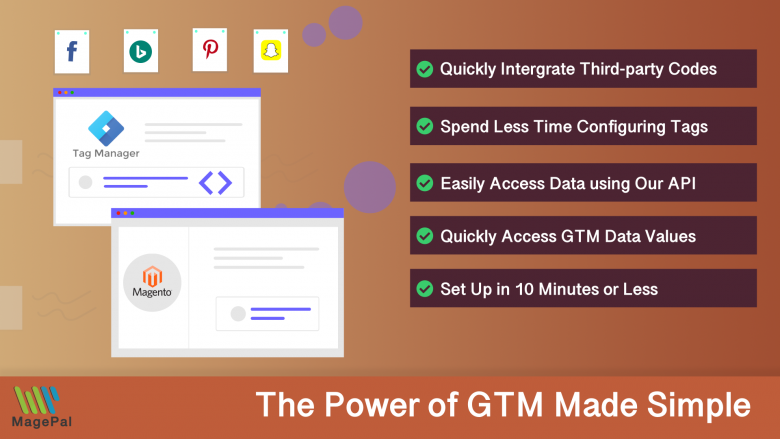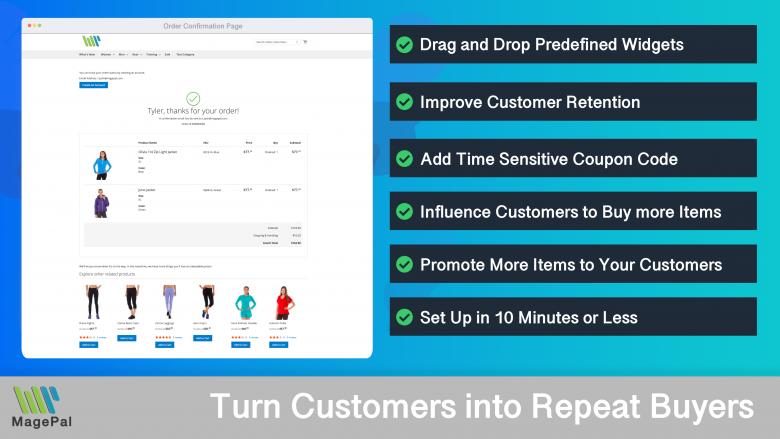Push the limits of your Adobe Commerce store with MagePal Extension
Take your Adobe Commerce store to new heights with the power of MagePal extensions. Our expertly crafted code and rigorous testing ensure seamless integration with Adobe Commerce, giving you the freedom to focus on growing your business, not debugging. Upgrade your store's potential with MagePal.
Tips and Strategies: Unlocking the Secrets to Successful Magento SEO
As an online store owner, driving traffic to your website and improving your search engine optimization (SEO) is essential for success. If you’re using Magento as your ecommerce platform, there are several strategies you can use to improve your SEO and attract more customers. In this blog, we’ll explore some practical tips to help you improve your Magento SEO.
- Optimize your website’s structure The structure of your website plays a crucial role in SEO. A well-structured site makes it easy for search engines to crawl and index your pages, and it helps users find what they’re looking for. Here are a few tips to optimize your website’s structure:
- Use a clean and organized hierarchy for your categories and subcategories.
- Use clear and descriptive URLs for your pages and products.
- Use internal linking to connect related pages and products.
- Use a sitemap to help search engines crawl your site more efficiently. Conduct keyword research
- Keyword research is the process of identifying the words and phrases that people are searching for in relation to your products or services. By using the right keywords on your website, you can improve your chances of ranking higher in search engine results pages (SERPs). Here are a few tips for conducting keyword research:
- Use keyword research tools such as Google Keyword Planner or SEMrush to identify relevant keywords.
- Consider the intent behind the keywords – are people searching for information or looking to buy?
- Focus on long-tail keywords that are specific to your products or services.
- Use keywords in your website’s meta titles, descriptions, and content.
- Optimize your product pages Your product pages are some of the most important pages on your website, and they can have a big impact on your SEO. Here are a few tips for optimizing your product pages:
- Use descriptive and unique product titles and descriptions.
- Include high-quality images and videos.
- Use structured data to provide more information to search engines.
- Include customer reviews and ratings.
- Improve your website’s loading speed The loading speed of your website can have a significant impact on your SEO. A slow website can lead to higher bounce rates and lower rankings in search engine results. Here are a few tips to improve your website’s loading speed:
- Use a fast and reliable web hosting provider.
- Optimize your images and videos to reduce file size.
- Minimize the use of scripts and plugins.
- Use a content delivery network (CDN) to improve page load times.
- Focus on content marketing Content marketing is the process of creating and sharing valuable content to attract and retain customers. By creating high-quality content, you can improve your SEO and build your brand’s reputation. Here are a few tips for content marketing:
- Create a blog and regularly publish informative and engaging content.
- Use social media to promote your content and attract more visitors to your website.
- Focus on creating content that is relevant and valuable to your target audience.
- Use guest blogging to reach new audiences and build backlinks to your site.
- Build high-quality backlinks Backlinks are links from other websites that point to your website. They can have a big impact on your SEO, and building high-quality backlinks should be a key part of your strategy. Here are a few tips for building high-quality backlinks:
- Reach out to other websites and offer to write guest posts or provide other valuable content.
- Participate in online forums and communities related to your niche.
- Use social media to connect with influencers and other website owners.
- Focus on building links from high-quality websites with relevant content.
- Monitor your website’s analytics Finally, it’s important to regularly monitor your website’s analytics to track your progress and identify areas for improvement. Here are a few key metrics to track:
- Traffic – how much traffic is your website receiving, and where is it coming from?
- Bounce rate – what percentage of visitors are leaving your website after viewing just one page?
- Conversion rate – how many visitors are converting into customers?
- Keyword rankings – where is your website ranking in search engine results pages for your target keywords?
By regularly monitoring these metrics, you can identify what’s working and what’s not working for your website, and adjust your SEO strategy accordingly.
Magento SEO FAQs
What is Magento SEO?
Magento SEO is the process of optimizing your Magento online store to improve its visibility and ranking on search engine results pages (SERPs). It involves a variety of techniques, including website structure optimization, keyword research, product page optimization, content marketing, backlink building, and analytics tracking.
Why is Magento SEO important?
Magento SEO is important because it helps your online store to be found by potential customers who are searching for products or services related to what you offer. By improving your search engine rankings, you can increase traffic to your site, improve brand awareness, and ultimately boost sales.
What are the key elements of successful Magento SEO?
The key elements of successful Magento SEO include optimizing your website’s structure, conducting effective keyword research, optimizing your product pages, improving your website’s loading speed, focusing on content marketing, building high-quality backlinks, and monitoring your website’s analytics.
How can I optimize my website’s structure for Magento SEO?
To optimize your website’s structure for Magento SEO, you should use a clean and organized hierarchy for your categories and subcategories, use clear and descriptive URLs for your pages and products, use internal linking to connect related pages and products, and use a sitemap to help search engines crawl your site more efficiently.
How can I improve my product pages for Magento SEO?
To improve your product pages for Magento SEO, you should use descriptive and unique product titles and descriptions, include high-quality images and videos, use structured data to provide more information to search engines, and include customer reviews and ratings.
How can I track the success of my Magento SEO efforts?
You can track the success of your Magento SEO efforts by monitoring key metrics such as traffic, bounce rate, conversion rate, and keyword rankings. Tools such as Google Analytics and SEMrush can help you track these metrics and make data-driven decisions to improve your SEO strategy.
Improving your Magento SEO requires a multifaceted approach that encompasses website structure, keyword research, product page optimization, loading speed, content marketing, backlink building, and analytics. By following these tips and consistently applying them, you can improve your website’s visibility in search engine results pages and attract more visitors to your online store. Remember, SEO is an ongoing process, so be patient and persistent in your efforts. With the right approach, you can achieve success in the competitive world of ecommerce.
Magento 2 / Adobe Commerce Extensions
0
Total Downloads
11
years experience with Magento
30+
Magento / Adobe Commerce Extensions
Shop with confidence
With millions of downloads worldwide, install with confidence knowing that our extensions will just work.
Learn More About MagePal Extension
Is your Magento store ready for the future? Say hello to the new Google Analytics 4, which is built from the ground up with all-new features and advanced machine learning technology.
Related
- How to Add Google Analytics to Magento
- How To Prevent Magento Email From Being Marked As Spam
- Unlock the Full Potential of Your Hyvä Theme with MagePal's Google Tag Manager and Analytics Extension
- Magento and GDPR: Magento + GDPR + GA4
- Maximize Your E-commerce Data with MagePal's Google Tag Manager and Analytics Extension for Magento 2
- Why Upgrading to GA4 with Magento and Adobe Commerce is a Must
- Master Magento/Adobe Analytics: Optimize your eCommerce store
- The Importance of Adding a Newsletter Popup to Your Magento Store
- Proven Strategies to Increase Your Magento Sales
- Google Analytics 4 Extension for Magento 2
- Using Google Tag Manager and Magento to track conversions
- Upgrade to Google Analytics 4: A Step-by-Step Magento Guide
- Is Magento the Best E-commerce Platform for Your Business? Find out Now!
- Unlock the Power of GTM with Custom DataLayer
- Using Google Analytics and Magento to Optimize Your eCommerce Store
- Cheap Email marketing strategy for Magento
- Cost-effective email marketing for Magento
- How to Add Google Ads Enhanced Conversion Data to Magento / Adobe Commerce with MagePal Datalayer Extension
- Best Google Tag Manager Extension for Magento 2
- Best Magento 2 Google Analytics 4 Extension
- The Ultimate Guide to the Best Magento 2 SMTP Extensions
- Does Magento 2 Support Google Analytics 4?
- Exploring the Exciting New Features of Google Analytics 4 (GA4) for Magento Ecommerce
- How to Integrate TikTok Tracking Pixel with Magento 2 using Google Tag Manager
- The Benefits of Integrating Magento and Google Tag Manager
- How to Enhance Your Magento Store's Shipping Experience
- Magento and Google Tag Manager (GTM) FAQ - Key Questions Answered
- Magento 2 Google Tag Manager (GTM) Extension
- The Benefits of Integrating Magento and Google Tag Manager for E-commerce Success
- Boosting Your Magento Newsletter Conversion and Subscription Rate: Tips and Strategies
- Convincing Customers to Subscribe to Your Magento Newsletter: Tips and Strategies
- Maximize E-commerce Insights with Magento, GTM & GA4 Integration
- How to Setup Google Adwords (Google Ads) Conversion Tracking in Magento 2
- Understanding the Importance of a Data Layer in Google Tag Manager
- How to Improve Your Magento Sales with an Affiliate Program
- Implementing Facebook Pixel on Magento 2 with GTM Extension
- Best Practices for Using Affiliate Programs to Drive Traffic
- Drive More Sales to Your Magento & Adobe Commerce Site with Affiliate Programs
- Improve Magento Ads Conversion with GA4 and Google Ads Enhanced Conversion
- How Google Analytics 4 Can Enhance Your Google Ads Campaign
- How to Add a Social Sharing Block to Your Magento 2
- How to Drive More Traffic to Your Magento Store with Paid Google Ads
- Revolutionize Your Magento SEO with GA4 - Here's How!
- Socialize your Sales: Creative Ways to Boost Your Magento eCommerce with Social Media
- TikTok and Magento: The Ultimate Power Couple for eCommerce Success
Magento 2 Extensions
Get ahead of the competition with MagePal Magento 2 extensions - Unlock new opportunities and drive more sales.
Enhanced Transactional Emails
Get more from your order confirmation emails by promoting other complementary products.
DataLayer for Tag Manager
Whether you are integrating Bing, Facebook, SnapChat, Pinterest, or any other services our extension make it easy.
Enhanced Success Page
Add cross-sell, upsell, related products, social media links and other elements to your order confirmation.


